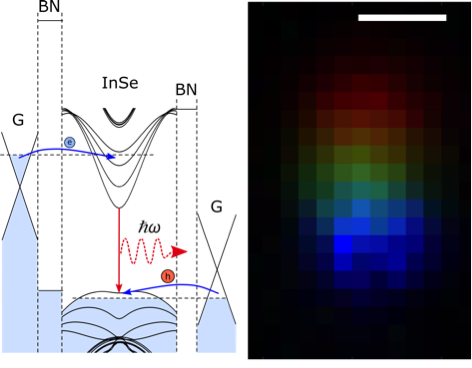Energy levels in electrons of 2D materials are mapped for the first time
Researchers based at the at have developed an innovative measurement method that allows, for the first time, the mapping of the energy levels of electrons in the conduction band of semiconducting .
Writing in , a team led by reports the first precise mapping of the conduction band of 2D indium selenide (InSe) using resonant tunnelling spectroscopy, to access the previously unexplored part of the electronic structure. They observed multiple subbands for both electrons and holes and tracked their evolution with the number of atomic layers in InSe.
Many emerging technologies rely on novel semiconductor structures, where the motion of electrons is restricted in one or more directions. Such confinement is in the nature of 2D materials and it is responsible for many of their new and exciting properties.
For instance, the colour of the emitted light shifts towards shorter wavelengths as they get thinner, analogous to quantum dots changing colour when their size is varied. As another consequence, the allowed energy available for the electrons in such materials, called conduction and valence bands, split into multiple subbands.
We hope this study will pave the way for exploration of intersubband transitions and lead to development of prototype optoelectronic devices with tuneable emission in the challenging terahertz range.
Optical transitions between such subbands present a large potential for real-life applications as they provide optically active in terahertz and far-infrared ranges, which can be employed for security and communication technologies as light emitters or detectors.
Dr Roman Gorbachev said: “We hope this study will pave the way for exploration of intersubband transitions and lead to development of prototype optoelectronic devices with tuneable emission in the challenging terahertz range.”
is one of The University of Manchester’s - examples of pioneering discoveries, interdisciplinary collaboration and cross-sector partnerships that are tackling some of the biggest questions facing the planet. #ResearchBeacons
